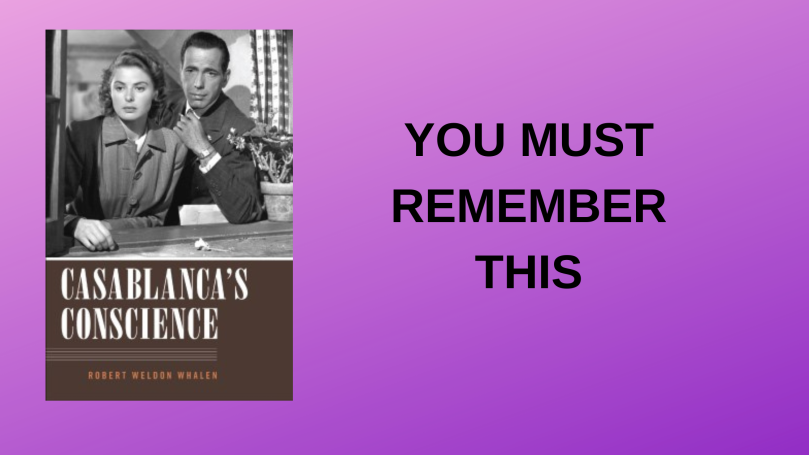My favorite movie in the world is Casablanca, which I could probably quote from start to finish. Being crazy about that movie, I’ve read all kinds of books about it, the making of it, the people who wrote it, acted in it, directed it, etc. I’m familiar with the backstories, the origins of the movie, its initial release and its longevity and its legends. So when I saw the new nonfiction book, Casablanca’s Conscience, by Robert Weldon Whalen, I had to check it out.
The book is an interesting contemplation of Casablanca through the lens of philosophy, and more particularly through the lives and thought of three philosophers who were living and writing at the time in which the movie’s set: Hannah Arendt, Dietrich Bonhoeffer, and Albert Camus. You may think (I certainly did at first) that this is just an excuse to talk about the philosophers by linking them to a popular movie, the same way books like The Physics of Superheroes is a sneaky and entertaining way of discussing concepts of physics after luring readers in via superhero stories. And probably I wouldn’t have read a book discussing those three philosophers if there weren’t the Casablanca connection, so if that’s what the author intended, he succeeded.
The lives and philosophies of Arendt, Bonhoeffer and Camus are interesting in themselves (so I would have deprived myself of some great stories and deep thought if I hadn’t been lured in by Casablanca), and the author manages to bring their biographies and their concepts to bear on the key themes of Casablanca in a way that makes them accessible and brings new insights into why this movie is so popular and so affecting to so many people decades after its initial release. The book discusses the movie’s setting in a place where so many characters are exiled (including Humphrey Bogart’s Rick), a place where none of the characters is really at home, and how that affects the story, and how the omnipresence of death (one of the first scenes has a person being shot by the police for running away, and people are killed throughout the movie) echoes the omnipresence of death in Europe at the time. For all the death and despair lurking around the story, Whalen sees Casablanca as a kind of purgatory, not hell: there can be a way out, and the whole movie is about how you find the way out. The philosophers have insights into the sense of exile, of how to find meaning when the world seems absurd and purgatorial, and what a person needs to survive in these circumstances.
Do you need to have watched the movie to read this book? Of course you do, but who would even pick up a book like this if they hadn’t seen the movie (probably multiple times)? Do you have to have a background in philosophy or history in order to appreciate this book? Not in the least. The author shines in explaining what these three people thought and where those ideas came from and how their lives affected their thought, and he does an even better job of connecting the ideas to the movie, so that, after reading this book, not only do I want to see Casablanca again, but I think even after all the times I’ve seen it, this time I will have new insights into the beloved characters and the well-known plot. And I can hardly give better praise to a book like this than that: it will illuminate even a movie I’ve seen so often I know it by heart.

